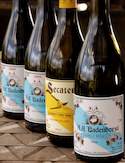The Beyerskloof strategy planning session also dealt with the issues of how existing members could become better acquainted with nominees for voting in as new members. This was proving increasingly difficult in a substantially larger, more diverse industry. It further touched on the finding of common ground among strongly individual, vastly different characters accommodated in a rapidly growing group.

The Guild, as ever intent on maintaining its good reputation and sense of integrity, wanted to be equitable without compromising on the calibre of membership. Hence the decision to invite nominations earlier in the year so that voting members could get to know all the nominees (who could be invited to technical tastings as guests).
During its third decade, the Guild had also begun to experience generational differences, with long-serving members sitting side by side with a new band of winemakers whose frame of reference differed markedly from the environment in which the Guild started operating in the 1980s.
Back then it was a small, closeted, restrictively regulated, vertically integrated industry in which a handful of creative, ambitious, independent winemakers had to manoeuvre and fight for every inch of freedom to experiment and seek levels of excellence in winemaking. Working as a group provided strength and inspiration.
By now Cape wine, a truly free-market, self-regulated enterprise - as far as farming and exporting are in South Africa - was part of a global business. Young South African winemakers had the opportunity of advanced, specialised study and worldwide travel. Not only was the world their oyster, but the Cape winelands now knew no boundaries: literally, as these adventurous individuals were freed to explore new terrain due to relaxation of regulations on areas of planting.
Winemakers today operate in a highly technological age, with push-button access to the latest in winemaking opinion and practice. By the same token, they need to react quickly to ever-more sophisticated, often fickle modern tastes and trends to remain competitive. Their independence of spirit is especially strong.
'It's an honour and a privilege to be invited to join the Cape Winemakers Guild. It's also a form of recognition by one's peers: it means a lot.'
Where the Guild continues to be relevant is that it offers a meeting ground for these talented, disparate role players, each with something to offer. The need for wisdom and knowledge based on experience, to be balanced by the energy and fast-moving pace of the current, is particularly apt in the world of winemaking.
The land has to be nurtured, the vine given time, nature's cycles understood and its vagaries respected to sustainably produce a consistently fine product of such infinitely varied character. After 30 years, the Guild was able to provide a living library of information on the modern era of Cape wine.
Amendments to the Guild's constitution to accommodate its growing and changing membership became part of its evolution in the third decade and, in 2011, provision was made for three types of membership.
The producing member was identified as anyone who has had the sole responsibility of producing outstanding wines over a period of at least five years at a cellar or for a brand and has been actively involved in all aspects of winemaking, from harvest to bottling. Such a member was expected to produce a special wine for auction each year (or at least within three years) and, as an indication of meeting a consistent standard of excellence, not forgo more than three auctions.
To ease the stringency of the latter ruling and continue to support diversity and innovation, members were subsequently encouraged to submit a wide range of styles of wine for the auction selection tasting. Scores and feedback were given to the members by their colleagues, whereupon it then became the individual's choice whether or not to put his or her wine on the sale (provided the wine exhibits no technical or microbiological faults but has merely been challenged on aspects of varietal or style integrity).
Technical membership was made available to any member who ceased to be responsible for winemaking in a cellar, no longer made the brand him/herself but who remained active in the industry and wished to participate in the Guild's technical tastings and continue contributing to the Guild's pool of knowledge and activities.
Honorary membership was conferred on anyone (active or no longer active in the wine industry) in appreciation for his or her contribution to the industry and to the Guild. An honorary member was welcome to attend technical tastings and other Guild functions by invitation.